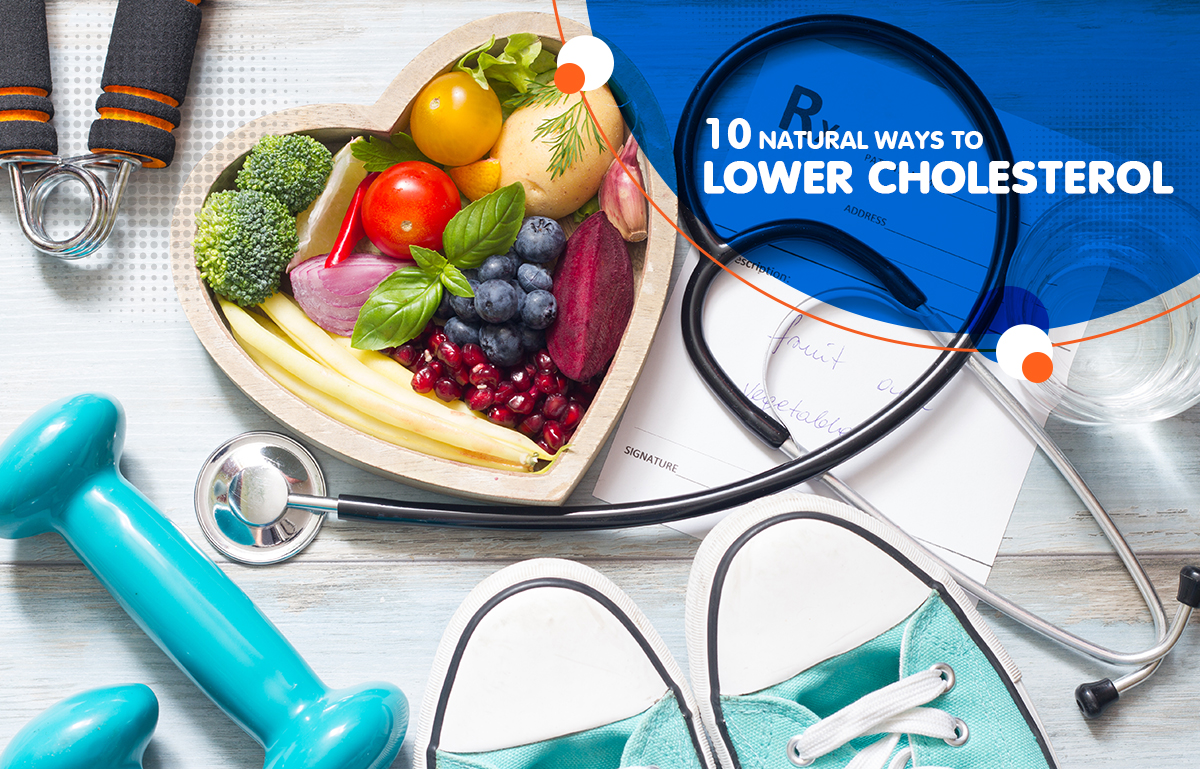
Cholesterol is a fat-like and waxy substance that the body requires for building healthy cells. Low-density lipoprotein or ‘bad cholesterol’ can make plaque in your arteries. This is one way to put you at greater risk for atherosclerosis, vascular issues, heart disease and more. Alternatively, high-density lipoprotein or good cholesterol removes bad cholesterol from the bloodstream.
If you have high cholesterol levels, then this means you have too much LDL. High cholesterol levels affect nearly one in every three people. There are changes you can make however, to increase your HDL and reduce your LDL cholesterol.
Lifestyle changes to lessen your cholesterol level
Below are ten things you can do to lower cholesterol level without medication. This will include foods that lower cholesterol, exercise ideas and more.
-
Check the nutrition labels to avoid trans fats
This is one of the easiest things to do to control your diet. Reading the nutrition labels will enable you to know about the nutrients you are eating in order to avoid trans fats, which are the worst ingredients for cholesterol. Trans fats, partially hydrogenated vegetable oil or hydrogenated oils are certain ingredients that are not at all good for your health.
Trans fats make products that last longer and these are common in many processed foods. But they even contribute to increasing bad LDL cholesterol levels and decreasing good HDL cholesterol levels. So if you want to reduce your cholesterol, make sure you go through the labels and try to avoid trans fats. They are one of the biggest offenders for high cholesterol and cutting them out from your diet can leave a huge impact on your overall health.
-
Select meats without saturated fats such as chicken or fish
As red meats are high in saturated fats, they can increase bad LDL cholesterol levels. Select skinless chicken for healthier options and do not eat processed meat.
As fish is low in saturated fats, you can also add more fish in your diet. Many types of fish contain omega-3 fatty acids. This can be beneficial for your heart and can improve HDL cholesterol levels. Here are some examples of fish types you may try and include them in your diet:
- Oily fish such as Atlantic or Pacific salmon, tilapia or Atlantic mackerel
- Freshwater fish such as lake herring and trout
- Fillets, canned light tuna and tuna steaks
- Saltwater whitefish such as cod and grouper
- Shellfish such as crab and shrimp
Hamburger and steak are hard to resist so if you indulge, select leaner cuts of meat. You can include saturated fats in your diet in moderation.
-
Get soluble fibre with kidney beans, whole grain bread and quinoa
Fibre can help with your digestive health and build your cardiovascular health. A low-cholesterol food is rich in soluble fibre. The soluble fibre will grab cholesterol into the gut before it enters into your bloodstream and lowers bad LDL cholesterol.
Certain foods which are rich in soluble fibre include the following:
- Barley
- Chickpeas
- Kidney beans
- Lentils
- Oats
- Quinoa
- Whole grain bread
It is important to know that the more processed a bean or grain is, the less likely it will have health benefits and nutritional value.
-
Boost fibre and unsaturated fats with vegetables, fruits and nuts
You can enjoy a snack between your meals to boost your energy level or to settle a hungry stomach. Some common snack foods are – chips, cookies, crackers, pastries or microwavable popcorn which are high in saturated and trans fats. Snacking on vegetables, fruits and nuts will help you to avoid bad fats and take good fats and fibre.
Raw nuts are high in unsaturated fats and nuts are great heart-healthy snack. They may help to increase good HDL cholesterol levels and lower bad LDL cholesterol levels. Other examples of foods that are high in unsaturated fat are avocados and olives.
Nuts with different veggies and fruits can be a good source of soluble fibre. You may include many of these foods to your diet as a double-dose of cholesterol-lessening impact.
Below are a few suggestions to consider:
- Almonds
- Apples
- Avocados
- Broccoli
- Blueberries
- Carrots
- Cashews
- Eggplant
- Grapes
- Okra
- Olives
- Oranges
- Peas
- Peanuts
- Pistachios
- Strawberries
- Walnuts
-
Prepare your food in a different way
Like you change what you buy in the market, similarly you may choose healthier ways to prepare your food to lower the cholesterol levels naturally. Take trimming fat and removing skin at the time of preparing fish or meat dishes. This will help you to retain the protein while, at the same time, lessen the intake of fat.
Try to focus on baking, boiling, grilling or poaching. These are some good ways to prepare food than breading or deep frying which adds up extra fat.
-
Change healthy oils with margarine
When you need to add fat for baking, cooking or pan frying, use healthy oils rather than solid fats such as butter. Solid fats have high amount of saturated fats in them though oils are higher in unsaturated fats and a better choice for you. You should use oils that have less than 4 grams of saturated fat each tablespoon without any trans fat.
Try using grapeseed oil, olive oil or sunflower oil than solid fat. If you use olive oil instead of butter, then change three quarters of butter in a recipe with olive oil.
-
Try one vegetarian meal every week
Incorporate one vegetarian meal each week without intimidation by the term "vegetarian." Opting for a well-crafted vegetarian dish simultaneously achieves several cholesterol-lowering objectives, such as consuming healthier fats and more soluble fiber. For instance, try a freshly made salad with sesame vinaigrette, alongside grilled, seasoned tofu. For dessert, blend strawberries, fresh blueberries, and oats into low-fat vanilla yogurt. The essential strategy is to establish a routine, like incorporating one vegetarian meal per week.
-
Increase physical activity in your daily routine for comprehensive health benefits
Wondering if you should start jogging daily or enrol in gym classes? While these are viable options, identifying a routine that suits you best is crucial. Remember, the most effective exercise for heart health is the one you consistently engage in. Aim for at least 2.5 hours of moderate physical activity weekly, focusing on daily exercises or committing to a few days each week. The key is to begin and gradually intensify your activity, like participating in hot yoga, jogging, or swimming laps. Regular exercise not only manages cholesterol but also lowers blood pressure and boosts overall physical, emotional, and mental well-being.
-
Collaborate with your doctor to reduce cholesterol levels.
Your primary care physician will guide you in creating an effective plan combining diet, lifestyle changes, and exercise to manage and lower cholesterol. Actions such as quitting smoking and losing weight significantly impact cholesterol levels—lowering bad LDL cholesterol and raising good HDL cholesterol, respectively.
Routine check-ins with your doctor are vital, whether your goal is weight loss, smoking cessation, or understanding the health benefits of reduced cholesterol. These check-ups involve cholesterol testing, progress monitoring, and necessary adjustments based on results.
Start lowering cholesterol level in a natural way
Remember, HDL cholesterol plays a crucial role in transporting cholesterol back to the liver for expulsion from the body. Maintain proper cholesterol balance by increasing good cholesterol and reducing bad cholesterol, thereby supporting your body's functions and potentially reducing the risk of heart disease and other complications. Preventing high cholesterol involves lifestyle modifications, such as dietary changes, weight reduction, increased exercise, smoking cessation, and regular consultations with your doctor.
These steps are the most natural and effective means to lower cholesterol and enhance overall health. Adopting new habits leads to a healthier, more enjoyable future, not a complete lifestyle overhaul.
Now is the ideal time to focus on your heart health. Our doctors are ready to provide necessary advice and treatment to help you achieve your health goals. Book a lipid profile blood test at our clinic for expert cholesterol monitoring by our qualified doctors.



-min.jpg)

